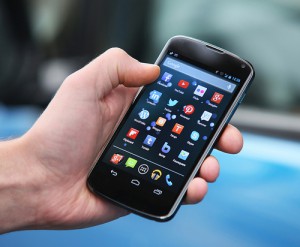
Smartphones have developed into a constant companion in our daily lives. Everything that we consider important while we are on the go is saved via a simple swift movement of our fingers. It only takes a couple of seconds to take a picture with the built-in camera and to upload it on a social network platform. There, friends and family can see where we are and what we are doing.
It has never been easier to produce data about our lives and to make them visible to our social environment. We may do so in the belief that this data belongs to us and that we can decide at any stage of its distribution which parts we are going to make public and which not.
Many do not know, however, that this is a fatal error. Your data can be used against you by people you possibly do not know. It is by no means a pleasant feeling when strangers possess something that belongs to your private life – but sadly this happens all too often in real life and the crucial point is that people too easily trust in smartphone technology.

It starts with used smartphones that are being resold on the internet or in small shops. Sellers trust in the delete function and believe that all their data – photographs, mail accounts, passwords, social media apps – are entirely wiped out from the device. That is not true at all. It is easy to recover data, regardless of how and where it was deleted. In fact there are specialized shops that offer this very service. Still, you do not need to be an expert as there are a lot of instructions and free recovery programmes on the internet that promise to reclaim deleted data.
In some particular cases this possibility seems to be a fortunate method – e.g. when the police is using the recovered data to find a culprit or if you accidently deleted some important pictures from your smartphone. On the other hand, this technology conceals its criminal potential. Data thieves may blackmail the former owner of the device or use the information for other criminal purposes.
That is only one side of the security problem when our personal data is concerned. It is not only through used smartphones that information may end up in the wrong hands. If a picture for example is shared on the web, you cannot foresee its possible circulation. It may reach people who use it for discrimination or for their personal amusement. You believe that you legally own the right to your picture, but in fact you have lost the power to decide who uses it and to what end.
Especially cyber bullying has become a big issue among adolescents nowadays. Data is being shared all too carelessly with false friends. The victims often feel helpless and even blackmailed when they lose their power to decide upon the use of their data or when making the effort to bring back information to its correct context.
We need to raise awareness among the youth that their data is vulnerable at any moment and that they therefore should reconsider what they truly want to share about their lives and what not. Many social platforms offer easy settings to protect the privacy of shared content. As for the smartphones: To be on the safe side, throw them away or spam them several times with useless data.
And what could be the motivation behind these cyber bullies to spy on other people’s lives and to use their private data to harm them? Is it the disability to deal with the problems of one’s own daily routine? Is it frustration, aggression or even both?
There may be much guessing. It is a fact, however, that someone who bullies in the cyberspace is a weakling.
About the author:
 Prof. Dr. Manfred Pohl is the Founder and Chairman of Frankfurter Zukunftsrat, the think tank that organises “My Europe”. more…
Prof. Dr. Manfred Pohl is the Founder and Chairman of Frankfurter Zukunftsrat, the think tank that organises “My Europe”. more…

